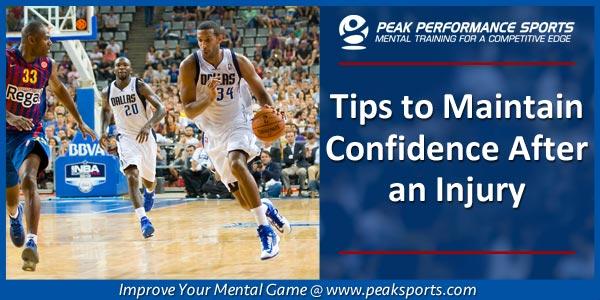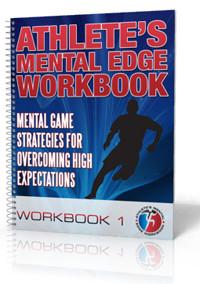
Comeback After Injuries
Injuries can be devastating and demoralizing to athletes…
The longer an athlete cannot practice, the more difficult the layoff and recovery process become.
But the day you step back into competition may be the most anxiety-ridden moment.
Returning from an injury may bring to the surface many fears: fear of re-injury, fear of losing your role on the team and fear of not performing at your previous level of play.
Playing with fear cannot, not only negatively affect your play, but increase the risk of further injury. You must manage the fear in order to maintain your confidence after an injury.
Dallas Maverick small forward Chandler Parsons is facing the same injury issues.
Parsons is heading into his fifth year and averaged 14.5 points per game over the course of his career. Parsons has been rehabbing a knee injury from last April and is closing in on a return to the basketball court this preseason.
To maintain confidence, Parsons practiced the skills he could perform safely.
PARSONS: “I was in the chair for the first month doing different things working on my handles, so when I could move and start using the pick and roll and have the ball in my hands more.”
Parsons has a positive outlook regarding his return to the court. Though Parsons is confident and well-prepared for his return, he has tempered his expectations.
PARSONS: “That’s the trickiest part for me. I don’t really know what to expect, because it feels fine. There’s been no pain, no swelling and no setbacks. There’s no reason for me not to be confident when I play. I’m not babying it at all. I’m doing different drills, and I’m in the weight room every day. I think a lot of it is going to be mental, just believing that it’s OK and I’ll be ready to go.”
Parsons has the right mentality in dealing with his return to competition which has aided his confidence and will help his transition back into competition.
Parsons has adopted a patient let’s-see-what-happens attitude which lessens anxiety and does set him up for failure.
The Optimal Mindset for Return to Competition
Fear of re-injury is normal. Many basketball players, in the back of their mind, have thoughts about the injury and return to the court. But that is where those thoughts need to be contained… in the back of your mind.
You want to focus on “what you want to happen” instead of “what you are afraid might happen.”
Focusing on what you can do and what you want to do will help you maintain your confidence throughout the injury process.
Try these tips to maintain confidence after an injury:
- Set manageable goals for your return to competition – Once you are fully recovered, you can adjust your goals upward. By not setting your goals too high, you will keep anxiety at bay and steadily increase your confidence with each step forward.
- Maintain a positive outlook – If you can focus on what you can do, you can prevent negativity from corroding your mindset. Your attitude toward returning to competition is everything. Fear only serves to hold you back from your potential.
Check Out Our Video of The Week, How Athletes Can Be Mentally Tough!
Learn Powerful Trust-Boosting Mental Strategies!
Are you frustrated with practicing harder in your sport only to have your effort undone by your mental game during competition?
Do you feel like your stomach is in a ball of knots and you cant think clearly because you are so anxious and tense stepping on the the field, court, course or track?
Check out our program, The Fearless Athlete!
The Fearless Athlete CD and workbook program is a 14-day plan for unbeatable trust. This program is ideal for any athlete or coach that wants to discover powerful mental strategies to overcome fear, perfectionism, and perform with trust.
Learn more about one of our most popular CD programs in The Confident Athlete Series…
The Fearless Athlete: A 14-Day Plan For Unbeatable Trust
What are customers saying?
“My son finished the entire Confident Athlete Program. The CD Program helped TREMENDOUSLY. He used it to keep positive thoughts flowing. He was able to focus on his fight instead of on his negative thoughts. He fought at his very best. We are thankful to God for leading us to your website. The CONFIDENT ATHLETE was perfect.”
~Wanda, Sports Parent
Add More Value To Your Mental Training Programs!
This workbook series was designed for coaches and mental coaches to use with their athletes.
The Athlete’s Mental Edge workbooks complement your existing mental training program. Each of the 15 workbooks in the Athlete’s Mental Edge System teaches your athletes a specific mental skill to improve their performance.
For mental coaches, this system is ideal for between session education.
For sports coaches, you’ll be able to conduct 15 team seminars using the workbook system.
In the Athlete’s Mental Edge workbook system, you receive 15 easy-to-read, practical Mental Edge Workbooks on PDF, as well as 16 coaches’ game plan MP3 audio files.
Athlete’s Mental Edge Workbook System
What are coaches saying?
“I am really pleased with the Athlete’s Mental Edge workbooks – they are fitting in really well with my coaching! I find they offer a great framework for doing workshop sessions. I have also used the workbooks with a few individual athletes – for the younger ones (12 and under). They are giving a good structure and framework to our sessions. The workbooks have worked well with all of them!”
~Kerri Morgan, Mental Game Coach
Boost Your Self-Confidence And Focus With Expert Mental Game Coaching!
Master mental game coach Dr. Patrick Cohn can help you overcome your mental game issues with personal coaching.
You can work with Dr. Patrick Cohn himself in Orlando, Florida or via Skype, FaceTime, or telephone. Call us toll free at 888-742-7225 or contact us for more information about the different coaching programs we offer!
What are our students saying?
“To compete at the highest level and perform your best, athletes need to train both physically and mentally. Peak Performance Sports and Dr. Cohn’s programs can help any athlete or team improve mental toughness and perform at their peak.”
~David M. Oliver, ATC/L., CSCS


Sports injuries seem like a difficult thing to get to recover in a timely fashion. So, I liked what you said about setting a manageable goal for your recovery. Then once you are fully recovered to still be smarts about what you attempt to do first. That does seem like a good thing to consider if you don’t want to get hurt again right after recovering.
Thanks, Ivy. We are currently working on a new program, The Injured Athlete. Stay tuned for updates as we get closer to the release…
I am glad you mentioned the longer an athlete can’t practice the more difficult the layoff and recovery process. My husband is a professional soccer player and was injured last season. Thanks for the sports medicine tips on maintaining confidence after injury.
Hi Sutton, don’t forget to check out our Soccer Psychology Blog! http://www.soccerpsychologytips.com/ there may be some useful resources for your husband as well!